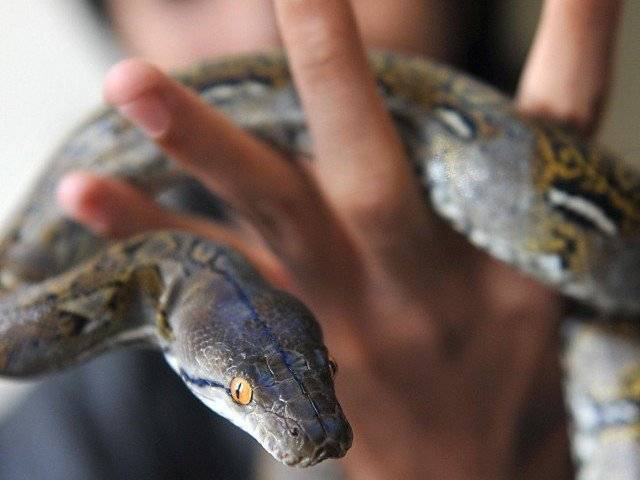
The sharp rise in injuries and attacks from venomous insects and reptiles each year corresponds directly with monsoon deluges which flood their habitat, Dr Muhammad Sami Mubarik, a zoology teacher at the Government College University, explains.
People most at risk are those involved in farming occupations that rely on seasonal rain (for example, farmers working on paddy fields), he says. “They are exposed to subterranean creatures, especially to snakes.”Some of the venomous species tend to be particularly aggressive this time of the year as their eggs hatch a month or two before monsoon season, Mubarik says.
Health warning: Doctors warn against monsoon-related illnesses

There are 77 known native species of snakes. Most of these are non-venomous. Most snakes prefer to breed and live in sandy soils, he says. Rainy season wreaks havoc on their homes and they leave the holes to save their lives.
“Unprovoked snakes generally do not attack humans. They bite if trodden upon. This can happen accidently as in the dark or when someone picks up bundles of leaves and wood.” Sometimes at night, they venture into residential areas looking for food (lizards, mice and small rodents) and bite people sleeping on the floor, he says.
Snakebites cause more fatalities than terrorist attacks, Syed Muhammad Shamim Fakhri, a researcher formerly associated with the World Wildlife Fund-Pakistan, says. “The Health Department has records of snakebite injuries far more lethal and grotesque than those recounted by counter-terrorism experts,” he says.
Fakhri’s scholarly work involves spending a lot of time studying reptiles in the field. The presence of reptiles in urban spaces and residential areas is closely tied with the kind of land urban planners develop housing schemes on, he says. “If they use agricultural land for urban development, they encroach on these creatures’ homes.”
A large proportion of snakebite incidents Fakhri has gathered details on, take place in parks and recreational sites in former-agricultural urban neighbourhoods. However, most species steer clear of mulch and loamy soils, he says, and are concentrated in deserts and warmer districts of Pakistan – Tharparkar, Mitthi, Nangarparkar, Rahim Yar Khan and Bhakkar. Cotton fields are a regular haunt, he says.

“Barely 15 per cent of snakebite victims brought to Bahawal Victoria Hospital, in Bahawalpur, are from the city,” Muhammad Adnan, a hospital spokesperson, says. “Most of the victims get bitten while working in the fields during monsoon because that’s when snakes surface.”
Monsoon has arrived: City wakes up to sound of rain
However, despite the annual increase in the number of snakebite incidents in the province, most cases go unreported, Fakhri says.
Dildar Ahmed, an entomologist at the University of Agriculture Faisalabad, agrees. “This is a major hurdle in helping us gather accurate data regarding snakebites and bites from other venomous creatures.” Most incidents occur in rural areas, however, most of the victims are not taken to public health centres or hospitals, Ahmed says. “A lot of villages have their own cures…many people in rural areas prefer to take snakebite victims to local hakeems, or malangs at shrines.” Most deaths and injuries from venomous creatures are thus not reported with public health centres, so there is a serious lack of reliable data in this regard, he says.
In case of an emergency
In case of an attack from a venomous snake or scorpion, rush the patient to the nearest basic health unit, rural health centre, tehsil headquarters hospital, district headquarters hospital or any other health centre run by the government, within the hour, Dr Muhammad Aslam, a senior medical officer of the Faisalabad district Health Department, says. “If the patient is administered an anti-venom serum within the hour, there is a 99 per cent chance of survival.”
Dr Salman Kazmi of Mayo Hospital, Lahore, says, “Once you spot two puncture marks at the wound and blood flowing thickly from the wound, lay the victim down and tie a bandage right above the bite tight enough to stem the blood flow. Take the victim to a hospital as soon as possible for treatment and a dose of anti-venom.” In case there’s no doctor, use a sterilised knife to make small cuts into the dots and bleed out the venom, he says.
Broadly speaking, snake venom can carry four kinds of toxins, each of which affects the body in a different way. Cardiotoxins affect the heart tissue; neurotoxins act on the nervous system; cytotoxins affect tissue at the site of a bite or on tissue that absorbs the toxin; and hemotoxins coagulate blood and may cause internal bleeding.
Kazmi calls for an extensive awareness campaign in this regard. “Most people do not know how to act in case of a bite carrying neurotoxins.”

Aslam says it is unfortunate that many, instead, prefer visiting a private clinic or local quacks. “That can be dangerous… some people even visit snake charmers thinking they have the expertise to help in such cases.”
Preparedness
Lahore Health EDO Dr Zulfiqar Ali says the Health Department is aware this is “the season of snakebites”.
However, snakebites are rare in Lahore, he says. “As a precaution, however, the department has made sure that all government hospitals have stocks of anti-venom.”
He explains that the Health Department does not have to allocate a significant for anti-venom medicines because the National Institute of Health provides the tablets at cheap rates.
Heavy downpour: Rains continue to wreak havoc in Hyderabad
Dr Muhammad Rauf, medical superintendent of the Faisalabad DHQ Hospital, says they are equipped to deal with any cases of venomous bites brought to them. “We have sufficient stocks of anti-venom medicines.”
Faisalabad Health District Officer Arif Mehmood says all basic health units, rural health centres and tehsil headquarters hospitals have anti-venom medicines in their stock.
Dera Ghazi Khan Health EDO Syed Munawar Abbas says his department has checked stocks of anti-venom at 50 basic health units, tehsil headquarters and civil hospitals in the district. “The vaccines, ARV+ASV, are available at all the hospitals.”
He says most patients preferred to visit the Dera Ghazi Khan Teaching Hospital for treatment. Most cases come from the mountain range in the tribal areas of Dera Ghazi Khan district.
“Scorpions and dangerous snakes come out of their holes during rainy weather…topsoil erosion because of floods adds to the problem.”
Teams of the Health Department raise awareness about the hazard during their flood relief efforts, he says.
Bahawal Victoria Hospital, Bahawalpur, has 1,600 anti-venom vials in stock, Emergency Director Nasir Bukhari says. “This is more than enough to cater to all likely snakebite victims.”
BVH Medical Superintendent Shahid Faraz says if ever the anti-venom medicines runs out, they have been authorised to procure vaccine from private stores. He says the vaccine could cost between Rs2,200 and Rs4,800. “It depends on the nature and type of snake venom.”
Matter of emergency
Muhammad Naveed Ali, a student of grade 12, was wheeled into the Emergency Ward of the Faisalabad DHQ Hospital at around 2am on July 28. The 18-year-old had suffered a snake bite in his sleep and was barely conscious.
The doctors injected him with nine anti-allergy injections instead of administering a dose of anti-venom serum, the boy’s father Muhammad Khalid, a retired WAPDA official, says. “My child died because of the negligence of the doctor on night duty.”
He says that the doctors on duty had failed to recognise the symptoms of snakebite and had made an erroneous assessment. “They treated him for an anaphylactic reaction and gave him anti-venom when it was too late.”
Khalid says there is a need to raise awareness about what to do in case of snakebite. “People should be aware of the symptoms and immediate steps to take to save a life.”
However, he says, doctors need to be trained in this as well. “Medical officers should be able to observe symptoms of snakebite after examining a patient and not delay treatment.”
Published in The Express Tribune, August 11th, 2016.
1732071267-0/lana-(2)1732071267-0-405x300.webp)
1727242355-0/Diddy-(1)1727242355-0-165x106.webp)

1732063440-0/elon-(3)1732063440-0-165x106.webp)

1732011525-0/Express-Tribune-(8)1732011525-0-270x192.webp)


1732012115-0/Untitled-design-(14)1732012115-0-270x192.webp)








COMMENTS (1)
Comments are moderated and generally will be posted if they are on-topic and not abusive.
For more information, please see our Comments FAQ